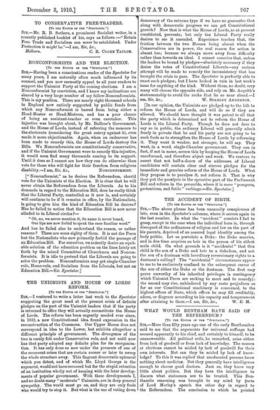THE UNIONISTS AND HOUSE OF LORDS REFORM.
[To THE EDITOR OF THE "SPECTATOR."]
ventured to write a letter last week to the Spectator suggesting the great need at the present crisis of definite pledges on the part of the Unionist leaders that if the party is returned to office they will actually reconstitute the House of Lords. The reform has been urgently needed ever since, in 1832, a new Constitutional idea found expression in the reconstruction of the Commons. Our Upper House does not correspond in idea to the Lower, but exhibits altogether a different principle of government. The divergence of the two is rarely felt under Conservative rule, and not until now Las that party adopted any definite plan for its reorganisa- tion. It has only done so now under the pressure of one of the recurrent crises that are certain sooner or later to sweep the whole structure away. This flagrant democratic upheaval which you detest, and of which Mr. Lloyd George is the exponent, would not have occurred but for the stupid retention of an institution wholly out of keeping with the later develop- ments of popular government. With these developments I, and no doubt many " moderate " Unionists, are in deep general sympathy. The world must go on, and they are only fools who would try to stop it. But what is the use of voting down democracy of the extreme type if we have no guarantee that along with democratic progress we can get Constitutional growth ? Now that is what the House of Lords, as at present constituted, prevents ; but only the Liberal Party really desires to see it amended. Experience teaches that, the friction between the two Houses being absent when the Conservatives are in power, the real reason for action is absent too; because we always move away from difficulty rather than towards an ideal. I cannot conceive that, unless the leaders be bound by pledges—absolutely necessary if they desire the votes of Constitutional Liberals—any serious attempt will be made to remedy the inconsistency that has brought the crisis to pass. The Spectator is perfectly able to exact such pledges; but I have looked in vain in last week's issue for anything of the kind. Without them, no doubt, very many will choose the opposite side, and rely on Mr. Asquith's statesmanship to avoid the rocks that lie so near ahead.—I [In our opinion, the Unionists are pledged up to the hilt to reform the House of Lords, and will do so if they are allowed. We should have thought it was patent to all that the party which is determined not to reform the House of Lords is the Liberal Party. Though he does not dare to say so in public, the ordinary Liberal will generally admit freely in private that be and his party are not going to be such fools as to strengthen the House of Lords by reforming it. They want it weaker, not stronger, he will say. They want, in a word, single-Chamber government. They can in fact, if not in name, secure this by keeping the House of Lords unreformed, and therefore abject and weak. We venture to assert that not half-a-dozen of the addresses of Liberal candidates will contain clear and sincere pledges for the immediate and genuine reform of the House of Lords. What they propose is to paralyse it, not reform it. That is why they put the paralysis in the operative part of the Parliament Bill and reform in the preamble, where it is mere "pompous, pretentious, and futile" verbiage.—En. Spectator.]










































































 Previous page
Previous page